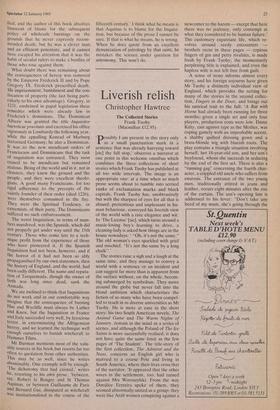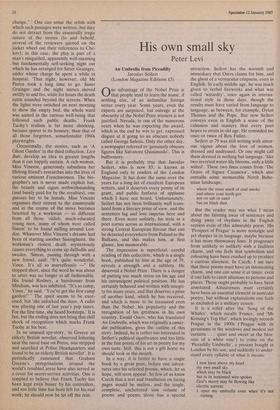Liverish relish
Christopher Hawtree
The Collected Stories Frank Tuohy (Macmillan £12.95)
Possibly I am present in this story only as a small punctuation mark in a sentence that was already hurrying toward
[sic] the full stop,' observes a narrator at one point in this welcome omnibus which combines the three collections of short stories which Frank Tuohy has published at all too wide intervals. The image is an appropriate one: at a time when so much prose seems about to tumble into serried ranks of exclamation marks and block capitals, Frank Tuohy has, unobtrusively but with the sharpest of eyes for all that is absurd, pretentious and unpleasant in hu- man behaviour, conveyed his liverish view of the world with a rare elegance and wit. In 'The License' [sic], which turns around a music-loving boy's learning to drive, a cleaning-lady is asked how things are in the house nowadays. "Oh, it's not the same." The old woman's eyes sparkled with grief and mischief. "It's not the-same by a long chalk".'
The stories raise a sigh and a laugh at the same time, and they manage to convey a world with a sentence or an incident and can suggest far more than is apparent from the surface without, on the whole, becom- ing submerged by symbolism. They move around the globe but never fall into the bland ambition which characterises the fiction of so many who have been compel- led to teach in as diverse universities as Mr Tuohy. He is more at ease in the short story: his two South American novels, The Animal Game and The Warm Nights of January, remain in the mind as a series of scenes, and although the Poland of The Ice Saints is more successfully realised, it does not have quite the same force as the few pages of 'The Student'. The title-story of the first collection, The Admiral and the Nuns, concerns an English girl who is married to a coarse Pole and living in South America, where their lives cross that of the narrator. 'It appeared that the other wives in the settlement, too, had turned against Mrs Woroszylski. From the way Doralice Ferreira spoke of them. ihey seemed abnormally united as a group: they were like Arab women conspiring against a
newcomer to the harem — except that here there was no jealousy, only contempt at what they considered to be human failure.' The customary expatriate life, which re- volves around seedy encounters — brothels recur in these pages — copious fingers of gin and petty rivalries, is made fresh by Frank Tuohy; the momentarily perplexing title is explained, and even the hapless wife is not left free from guilt.
A sense of irony informs almost every story, and his foreign sojourns have given Mr Tuohy a distinctly individual view of England, which provides the setting for many of the stories in the second collec- tion, Fingers in the Door, and brings out his satirical trait to the full: 'A Rat with Horns had already been running for three months; given a single set and only four players, production costs were low. Dame Kitty, cast against type as the Mother, was coping gamely with an improbable accent, a shabby quilted dressing gown and a brass-blonde wig with blueish roots. The play contains a triangle situation involving herself, her 18-year-old son, and her son's boyfriend, whom she succeeds in seducing by the end of the first act. There is also a "running gag" concerning the fourth char- acter, a crippled old uncle who suffers from enuresis. The entrance of the two young men, traditionally attired in jeans and leather, occurs eight minutes after the rise of the curtain. The son's opening line is addressed to his lover: "Don't take any heed of my mum, she's going through the
change." ' One can sense the relish with which such passages were written, but they do not detract from the essentially tragic nature of the stories (lo and behold, several of the reviewers quoted on the jacket wheel out their references to Che- kov); in this case, the play is part of a man's misguided, apparently well-meaning but fundamentally self-seeking night out which he has arranged for Sister Grainger, under whose charge he spent a while in hospital. 'That night, however, old Mr Pierce took a long time to go. Sister Grainger and the night nurses moved swiftly to and fro, while for hours the death rattle sounded beyond the screens. When the lights were switched on next morning to show the empty bed, the whole ward was united in the curious well-being that followed such public deaths.' Frank Tuohy's realism is far more shocking, because sparer in its honesty, than that of all those forgotten, sensationalist 1960s playwrights.
Occasionally, the stories, such as 'A Ghost Garden' in the third collection, Live Bait, develop an idea to greater lengths than it can happily sustain. A rich woman, Miss Vincent, generously subsidises her lifelong friend's researches into the lives of various eminent Frenchwomen. The bio- grapher's sex is never made explicit but, the brandy and cigars nothwithstanding (and barely paid for by the royalties), one guesses her to be female. Miss Vincent organises their retreat to the countryside and in the course of the move becomes besotted by a workman — so different from all those 'oldish, much-educated young men, many of whom were called Simon' to be found milling around Lon- don. Whatever Miss Vincent's dreams had been of starting another Sissinghurst, the workman's violent death mysteriously causes everything to come up daffodils and swedes. 'Simon, passing through with a new friend, said: "It's quite wonderful, Vince. It's all so marvellously —" He stopped short, since the word he was about to utter was no longer at all fashionable. His friend Rodney, a hairdresser from Mitcham, was less inhibited. "It's so camp, Vince," he said. "You've got the first camp garden!"' The spirit seems to be exor- cised, but 'she unlocked the door. A radio was playing one of last year's pop tunes. For the first time, she heard footsteps.' It is fun, but the ending does not bring that chill shock of recognition which marks Frank Tuohy at his best.
In an unusual spy-story, in Greece an elderly British novelist, observed loitering near the naval base on Poros, was stripped and searched at Police Headquarters and found to be an elderly British novelist'. It is periodically rumoured that Graham Greene's peregrinations around the world's troubled areas have also served as a cover for secret-service activities. One is tempted to believe that Frank Tuohy has been kept even busier by his controllers, and too little time has been left for his real work; he should now be let off the rein.







































 Previous page
Previous page